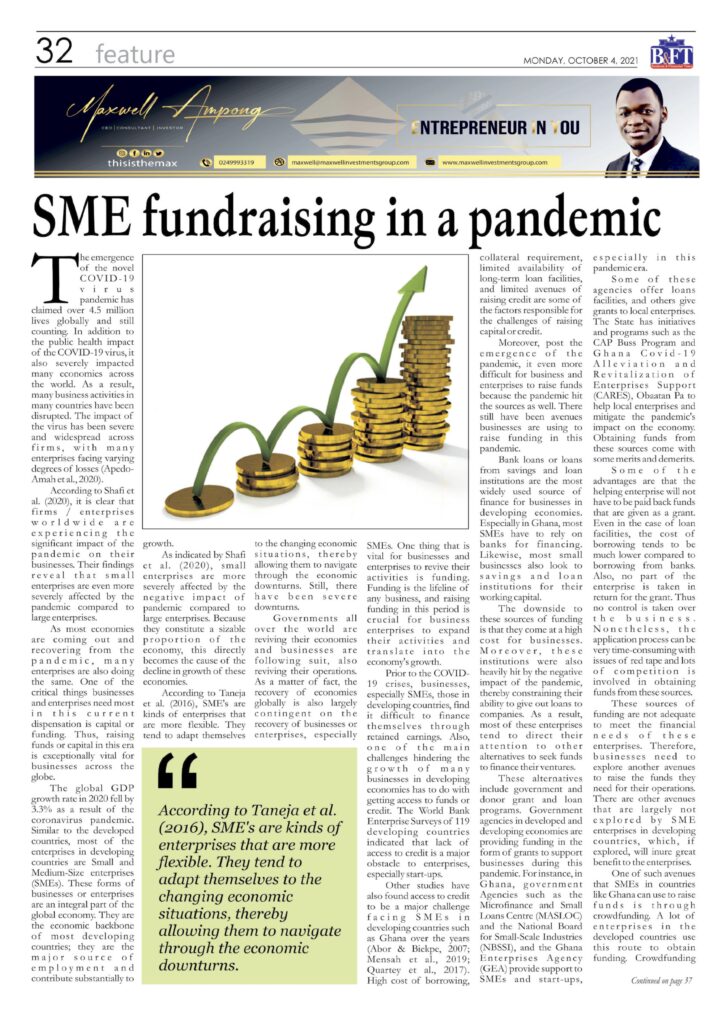
The emergence of the novel COVID-19 virus pandemic has claimed over 4.5 million lives globally and still counting. In addition to the public health impact of the COVID-19 virus, it also severely impacted many economies across the world. As a result, many business activities in many countries have been disrupted. The impact of the virus has been severe and widespread across firms, with many enterprises facing varying degrees of losses (Apedo-Amah et al., 2020).
According to Shafi et al. (2020), it is clear that firms / enterprises worldwide are experiencing the significant impact of the pandemic on their businesses. Their findings reveal that small enterprises are even more severely affected by the pandemic compared to large enterprises.
As most economies are coming out and recovering from the pandemic, many enterprises are also doing the same. One of the critical things businesses and enterprises need most in this current dispensation is capital or funding. Thus, raising funds or capital in this era is exceptionally vital for businesses across the globe.
The global GDP growth rate in 2020 fell by 3.3% as a result of the coronavirus pandemic. Similar to the developed countries, most of the enterprises in developing countries are Small and Medium-Size enterprises (SMEs). These forms of businesses or enterprises are an integral part of the global economy. They are the economic backbone of most developing countries; they are the major source of employment and contribute substantially to growth.
As indicated by Shafi et al. (2020), small enterprises are more severely affected by the negative impact of pandemic compared to large enterprises. Because they constitute a sizable proportion of the economy, this directly becomes the cause of the decline in growth of these economies.
According to Taneja et al. (2016), SME’s are kinds of enterprises that are more flexible. They tend to adapt themselves to the changing economic situations, thereby allowing them to navigate through the economic downturns. Still, there have been severe downturns.
Governments all over the world are reviving their economies and businesses are following suit, also reviving their operations. As a matter of fact, the recovery of economies globally is also largely contingent on the recovery of businesses or enterprises, especially SMEs. One thing that is vital for businesses and enterprises to revive their activities is funding. Funding is the lifeline of any business, and raising funding in this period is crucial for business enterprises to expand their activities and translate into the economy’s growth.
Prior to the COVID-19 crises, businesses, especially SMEs, those in developing countries, find it difficult to finance themselves through retained earnings. Also, one of the main challenges hindering the growth of many businesses in developing economies has to do with getting access to funds or credit. The World Bank Enterprise Surveys of 119 developing countries indicated that lack of access to credit is a major obstacle to enterprises, especially start-ups.
Other studies have also found access to credit to be a major challenge facing SMEs in developing countries such as Ghana over the years (Abor & Biekpe, 2007; Mensah et al., 2019; Quartey et al., 2017). High cost of borrowing, collateral requirement, limited availability of long-term loan facilities, and limited avenues of raising credit are some of the factors responsible for the challenges of raising capital or credit.
Moreover, post the emergence of the pandemic, it even more difficult for business and enterprises to raise funds because the pandemic hit the sources as well. There still have been avenues businesses are using to raise funding in this pandemic.
Bank loans or loans from savings and loan institutions are the most widely used source of finance for businesses in developing economies. Especially in Ghana, most SMEs have to rely on banks for financing. Likewise, most small businesses also look to savings and loan institutions for their working capital.
The downside to these sources of funding is that they come at a high cost for businesses. Moreover, these institutions were also heavily hit by the negative impact of the pandemic, thereby constraining their ability to give out loans to companies. As a result, most of these enterprises tend to direct their attention to other alternatives to seek funds to finance their ventures.
These alternatives include government and donor grant and loan programs. Government agencies in developed and developing economies are providing funding in the form of grants to support businesses during this pandemic. For instance, in Ghana, government Agencies such as the Microfinance and Small Loans Centre (MASLOC) and the National Board for Small-Scale Industries (NBSSI), and the Ghana Enterprises Agency (GEA) provide support to SMEs and start-ups, especially in this pandemic era.
Some of these agencies offer loans facilities, and others give grants to local enterprises. The State has initiatives and programs such as the CAP Buss Program and Ghana Covid-19 Alleviation and Revitalization of Enterprises Support (CARES), Obaatan Pa to help local enterprises and mitigate the pandemic’s impact on the economy. Obtaining funds from these sources come with some merits and demerits.
Some of the advantages are that the helping enterprise will not have to be paid back funds that are given as a grant. Even in the case of loan facilities, the cost of borrowing tends to be much lower compared to borrowing from banks. Also, no part of the enterprise is taken in return for the grant. Thus no control is taken over the business. Nonetheless, the application process can be very time-consuming with issues of red tape and lots of competition is involved in obtaining funds from these sources.
These sources of funding are not adequate to meet the financial needs of these enterprises. Therefore, businesses need to explore another avenues to raise the funds they need for their operations. There are other avenues that are largely not explored by SME enterprises in developing countries, which, if explored, will inure great benefit to the enterprises.
One of such avenues that SMEs in countries like Ghana can use to raise funds is through crowdfunding. A lot of enterprises in the developed countries use this route to obtain funding. Crowdfunding platforms allow businesses to raise funds from several small contributions from many individual investors. An enterprise can either run an equity-based crowdfunding campaign, where equity is exchanged for investment, or a reward-based crowdfunding campaign, where investors receive rewards in exchange for their capital. There are platforms for crowdfunding that enterprises in developing countries like Ghana can take advantage of to raise funds.
Venture capital financing is another great route enterprises in Ghana can explore. Venture capitalists provide funding in exchange for control of decision-making and a portion of the enterprises’ ownership. Venture capitalists are responsible for investing and growing some of the world’s most innovative companies, including Facebook, Uber, and Twitter. Venture capitalists are mostly interested in technology-driven businesses and companies with high-growth potential in the information technology and communications sectors. Businesses that fall within these areas can easily get funding from venture capitalists.
Ghana has the Venture Capital Trust Fund (VCTF), established by Venture Capital Trust Fund ACT, 2004 (ACT 680). The objective is to provide financing to Small and Medium Enterprises (SMEs). Although it is relatively very young in Ghana, there are a number of venture capital companies in Ghana from which businesses can source funding.
Start-ups can also take advantage of Business incubators and accelerator programs. These programs usually provide start-ups with small investments in exchange for equity, mentorship, and network access to enable them to become sustainable and self-sufficient in the long term. This initiative also provides access to future investors upon the completion of the accelerator program. There are a number of business incubators and accelerator programs in Ghana.
A few I know in Accra are the Founder Institute Ghana, Stanbic Bank Incubator, MEST incubator, Orange Corners Ghana, Ghana Innovation Hub incubator, Innohub, TENGhana, Africa Skills Hub, Recycle Up Ghana, iSpace Foundation, Impact Hub Accra, Ghana Tech Lab, Footprints Africa and the Africa Digital Centre. In the northern parts of Ghana, there is the Northern Innovation Lab, HOPin Academy, NONI HUB, Dansyn Innovation Social Organization (Dansyn ISO), iValley Ghana, and more. Other hubs include Ashesi Venture Incubator, GhanaThink, Ho Node Hub, Whizzy Academy, hapaSpace Innovation Hub, Kumasi Hive, Women’s Haven Africa, Chambers Market, Duapa Werkspace, and again many many more.
Raising funds as an SME in the pandemic era is never easy. It is also not impossible. So the help is out there. The increasing number or business hubs, accelerators, incubators and networking opportunities can turn your situation around. You’d need to research and execute a fund-raising strategy that works best for you at increasing your chances of success.
—
REFERENCES
Abor, J., & Biekpe, N. (2007). Small business reliance on bank financing in Ghana. Emerging Markets Finance and Trade, 43(4), 93–102.
Apedo-Amah, M. C., Avdiu, B., Cirera, X., Cruz, M., Davies, E., Grover, A., Iacovone, L., Kilinc, U., Medvedev, D., & Maduko, F. O. (2020). Unmasking the Impact of COVID-19 on Businesses.
Mensah, A. O., Fobih, N., & Adom, Y. A. (2019). Entrepreneurship development and new business start-ups: Challenges and prospects for Ghanaian entrepreneurs. African Research Review, 13(3), 27–41.
Quartey, P., Turkson, E., Abor, J. Y., & Iddrisu, A. M. (2017). Financing the growth of SMEs in Africa: What are the contraints to SME financing within ECOWAS? Review of Development Finance, 7(1), 18–28.
Shafi, M., Liu, J., & Ren, W. (2020). Impact of COVID-19 pandemic on micro, small, and medium-sized Enterprises operating in Pakistan. Research in Globalization, 2, 100018.
Taneja, S., Pryor, M. G., & Hayek, M. (2016). Leaping innovation barriers to small business longevity. Journal of Business Strategy.
Abor, J., & Biekpe, N. (2007). Small business reliance on bank financing in Ghana. Emerging Markets Finance and Trade, 43(4), 93–102.
Apedo-Amah, M. C., Avdiu, B., Cirera, X., Cruz, M., Davies, E., Grover, A., Iacovone, L., Kilinc, U., Medvedev, D., & Maduko, F. O. (2020). Unmasking the Impact of COVID-19 on Businesses.
Mensah, A. O., Fobih, N., & Adom, Y. A. (2019). Entrepreneurship development and new business start-ups: Challenges and prospects for Ghanaian entrepreneurs. African Research Review, 13(3), 27–41.
Quartey, P., Turkson, E., Abor, J. Y., & Iddrisu, A. M. (2017). Financing the growth of SMEs in Africa: What are the contraints to SME financing within ECOWAS? Review of Development Finance, 7(1), 18–28.
Shafi, M., Liu, J., & Ren, W. (2020). Impact of COVID-19 pandemic on micro, small, and medium-sized Enterprises operating in Pakistan. Research in Globalization, 2, 100018.
Taneja, S., Pryor, M. G., & Hayek, M. (2016). Leaping innovation barriers to small business longevity. Journal of Business Strategy.
—
I hope you found this article insightful and enjoyable. Subscribe to the ‘Entrepreneur In You’ newsletter here: https://lnkd.in/d-hgCVPy.
I wish you a highly productive and successful week ahead!
♕ —- ♕ —- ♕ —- ♕ —- ♕
Disclaimer: The views, thoughts, and opinions expressed in this article are solely those of the author, Dr. Maxwell Ampong, and do not necessarily reflect the official policy, position, or beliefs of Maxwell Investments Group or any of its affiliates. Any references to policy or regulation reflect the author’s interpretation and are not intended to represent the formal stance of Maxwell Investments Group. This content is provided for informational purposes only and does not constitute legal, financial, or investment advice. Readers should seek independent advice before making any decisions based on this material. Maxwell Investments Group assumes no responsibility or liability for any errors or omissions in the content or for any actions taken based on the information provided.


